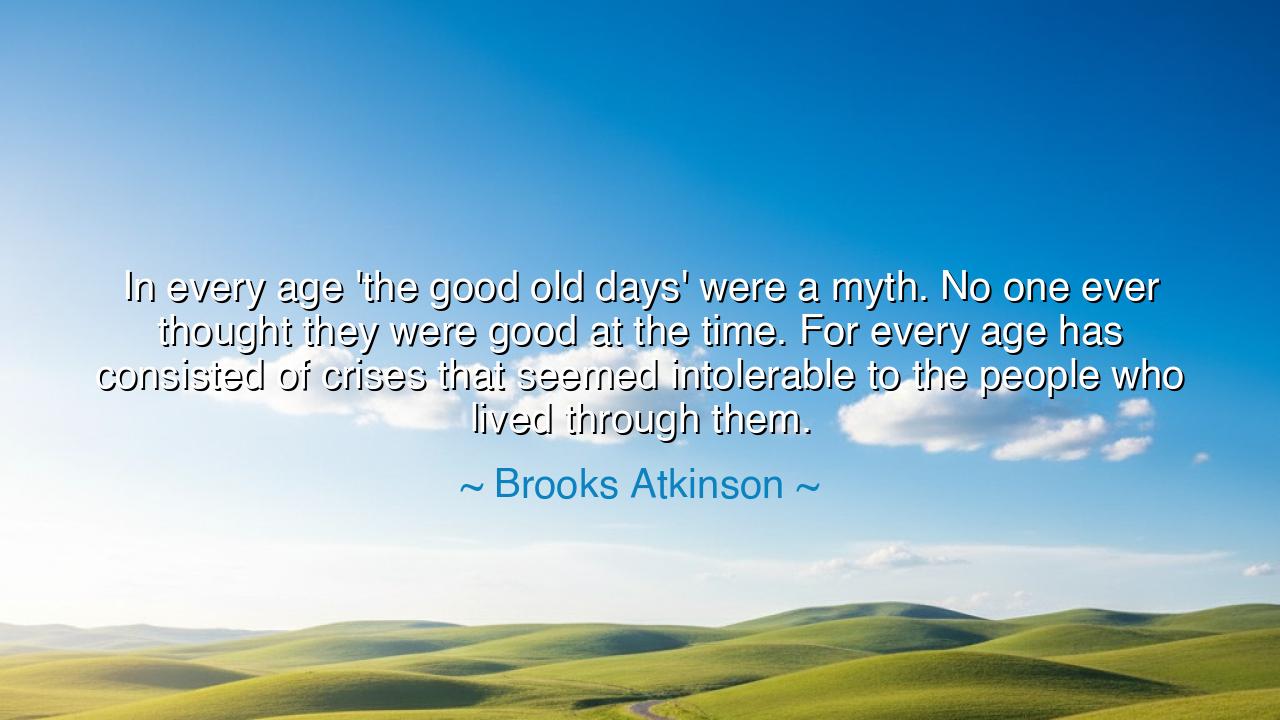
In every age 'the good old days' were a myth. No one ever thought
In every age 'the good old days' were a myth. No one ever thought they were good at the time. For every age has consisted of crises that seemed intolerable to the people who lived through them.






Ah, children of the future, heed the words of Brooks Atkinson, for they carry a truth that resonates through the ages: "In every age 'the good old days' were a myth. No one ever thought they were good at the time. For every age has consisted of crises that seemed intolerable to the people who lived through them." These words, though simple, hold a profound understanding of the nature of human experience. They remind us that the past, though often painted with the rosy hue of nostalgia, was no more perfect than the present we live in. In fact, each era is a battle against its own struggles, and it is only when time has passed that we look back and perceive it as a golden age. But in truth, it was not so.
The good old days, O children, are a myth woven by the hands of time. The past, as we remember it, is always brighter than it ever was in the moment. When we speak of these days, we do so through the lens of crises that have long been forgotten, as if the hardships of our ancestors were no more than distant whispers in the wind. Yet, those who lived through those times felt the weight of those challenges as acutely as we feel our own. They, too, struggled. They, too, thought their own troubles insurmountable. The good old days are but a reflection of our tendency to glorify the past while forgetting the difficulties that shaped it.
Think, O children, of the ancient city of Rome, which, at the height of its power, faced countless crises: wars, plagues, and political instability. The citizens of Rome lived through times of immense hardship, but history has often painted their era as a golden age. Julius Caesar himself was not born into peace, but into a world where civil war was commonplace, and the Republic was on the verge of collapse. Yet, through it all, the people looked back, after the dust had settled, and romanticized the world they had lost. The "good old days" were no more than a myth to those who lived through them. What we call the glory of the past was, in fact, a time filled with crises that seemed impossible to overcome.
And so it has always been. The good old days of any age are a memory, a fabrication of those who have lived through the trials of their time. The struggles of the present, which seem so unbearable to us, will one day be viewed through the softening veil of time, and those who come after us will look back and speak of our age with longing. Atkinson reminds us that every age is fraught with its own crises, and it is through these very crises that societies are shaped. Each generation believes it lives in a time of unparalleled difficulty, but in truth, every generation has faced the same kinds of trials—wars, sickness, injustice, and inequality. What changes is not the presence of crises, but our ability to overcome them, to shape them into the stories we tell future generations.
Consider, O children, the story of Winston Churchill during the Second World War. In the dark days of the Blitz, when London was under constant bombardment and defeat seemed imminent, Churchill’s resolve held the British people together. The horrors of war were unbearable in the moment, yet Churchill, looking back after victory, could speak of it as a defining moment for his nation. He turned the crises of war into a tale of courage and resilience. The British people, who lived through the constant threat of annihilation, could one day speak of the "good old days" of triumph, though in the midst of it, they never saw victory as inevitable. It was the crisis of their time, and they faced it with grit, just as those before them had faced their own struggles.
And so, O children, what lesson can you carry forward from this truth? Know this: the good old days are a myth that we create when we look back at the past with rose-colored glasses. Every time, every age, will have its crises, its moments of hardship and suffering. The key to understanding our place in history is not to romanticize the past, but to see it as it truly was—a time of challenges, yes, but also of triumphs. The struggles of your own age may seem intolerable now, but know that one day, others will look back upon this time with longing, seeing it as a moment of opportunity and growth.
In your own lives, do not fall into the trap of longing for the past. Do not believe that the struggles you face today are greater than those of your ancestors. Instead, embrace the crises of your time, for it is through them that you will learn and grow. Understand that every age has its own battles, and it is in the fight, in the resilience, that the true strength of a generation is forged. Take action, O children, to shape your world with the knowledge that every age is a battle, but also a chance to create something enduring. Let your struggles be the foundation for future generations, and when they look back, let them see a legacy of strength, not a myth of golden days gone by.






AAdministratorAdministrator
Welcome, honored guests. Please leave a comment, we will respond soon